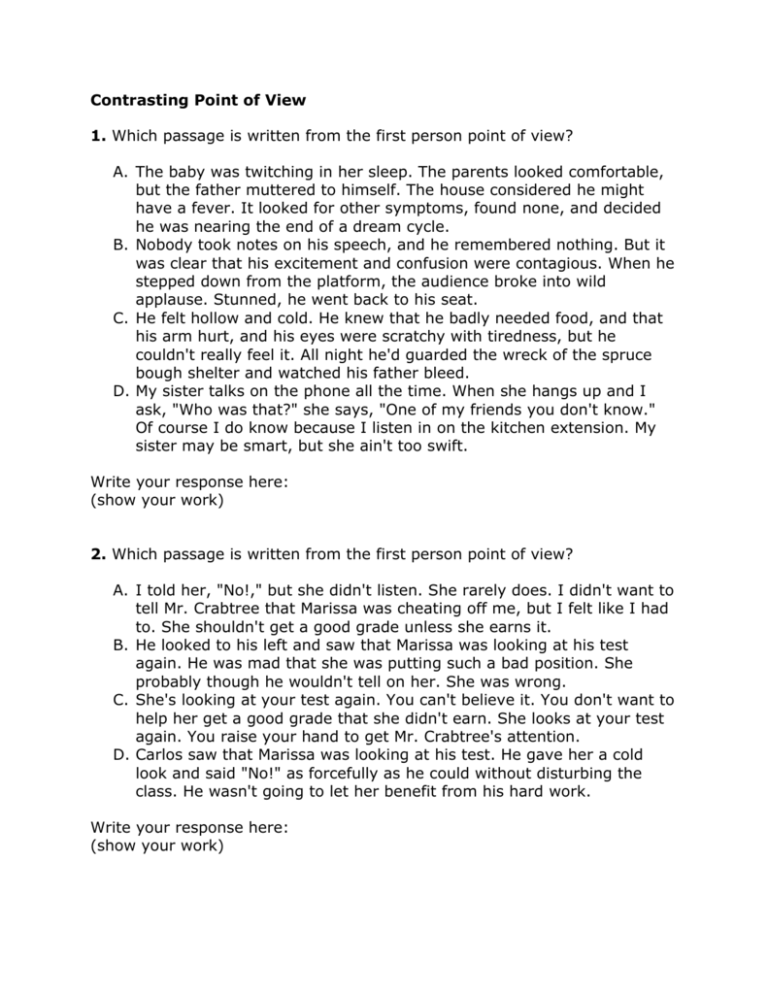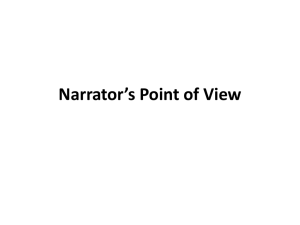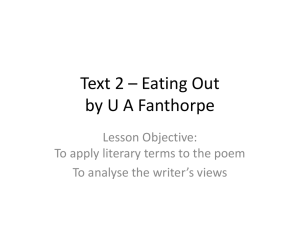
Contrasting Point of View
1. Which passage is written from the first person point of view?
A. The baby was twitching in her sleep. The parents looked comfortable,
but the father muttered to himself. The house considered he might
have a fever. It looked for other symptoms, found none, and decided
he was nearing the end of a dream cycle.
B. Nobody took notes on his speech, and he remembered nothing. But it
was clear that his excitement and confusion were contagious. When he
stepped down from the platform, the audience broke into wild
applause. Stunned, he went back to his seat.
C. He felt hollow and cold. He knew that he badly needed food, and that
his arm hurt, and his eyes were scratchy with tiredness, but he
couldn't really feel it. All night he'd guarded the wreck of the spruce
bough shelter and watched his father bleed.
D. My sister talks on the phone all the time. When she hangs up and I
ask, "Who was that?" she says, "One of my friends you don't know."
Of course I do know because I listen in on the kitchen extension. My
sister may be smart, but she ain't too swift.
Write your response here:
(show your work)
2. Which passage is written from the first person point of view?
A. I told her, "No!," but she didn't listen. She rarely does. I didn't want to
tell Mr. Crabtree that Marissa was cheating off me, but I felt like I had
to. She shouldn't get a good grade unless she earns it.
B. He looked to his left and saw that Marissa was looking at his test
again. He was mad that she was putting such a bad position. She
probably though he wouldn't tell on her. She was wrong.
C. She's looking at your test again. You can't believe it. You don't want to
help her get a good grade that she didn't earn. She looks at your test
again. You raise your hand to get Mr. Crabtree's attention.
D. Carlos saw that Marissa was looking at his test. He gave her a cold
look and said "No!" as forcefully as he could without disturbing the
class. He wasn't going to let her benefit from his hard work.
Write your response here:
(show your work)
3. Which passage is written from the first person point of view?
A. Uncle decided that the best thing would be to go to camp and bring me
back. Mrs. Kaplan opened the file and began studying it. The file was
all about me, Margaret Rose. Considering that this was only my ninth
day at camp, the folder was quite full.
B. There he listened to the routine business of the meetings and to
attacks on slavery as practiced in America: an institution seen by him
as degrading to slaveholders, as well as to their human property.
C. When the Great Man who lived above saw, he grew angry. He
descended to Earth, seated himself on a mountain, and hurled his
lightning bolts into the herd. The bull raced away north. In Native
American tradition, he still lived in that icy region.
D. The hours passed and the house grew busier—waking everyone up and
setting the temperature for showers and baths. It checked for news
that might interest the family, adjusted roof panels to create heat, and
raised the blinds on the day ahead.
Write your response here:
(show your work)
4. Which passage is written from the first person point of view?
A. Abbey hopped off my handlebars and walked to the water's edge. She
planted her hands on her hips. I locked my bike to a tree and walked
down to the charter docks, Abbey trailing behind. She groaned. She
was starting to annoy me. She made a face.
B. If he could obtain the bones of the creature in the article and display
them, he was sure they would create a sensation. According to the
description, the animal was as big as an elephant. Its remains were so
big that the writer called it a mammoth.
C. The robot butler rolled into the room. The kids exchanged looks. The
father paused his speech. The butler lifted the dish's lid. The family
stared. Grumps waited, the lid in his hand. He replaced the lid and left.
They heard him down the hallway.
D. He was physically imposing, yet, because he was a runaway, there
was something tentative in his manner. He nurtured a vain hope that
in such a gathering, he might be inconspicuous. He spoke only when
spoken to.
Write your response here:
(show your work)
5.
from The Five Orange Pips
by Sir Arthur Conan Doyle
When I glance over my notes and records of the Sherlock Holmes cases between
the years '82 and '90, I am faced by so many which present strange and interesting
features that it is no easy matter to know which to choose and which to leave. Some,
however, have already gained publicity through the papers, and others have not offered
a field for those peculiar qualities which my friend possessed in so high a degree, and
which it is the object of these papers to illustrate. Some, too, have baffled his analytical
skill, and would be, as narratives, beginnings without an ending, while others have been
but partially cleared up, and have their explanations founded rather upon conjecture and
surmise than on that absolute logical proof which was so dear to him. There is,
however, one of these last which was so remarkable in its details and so startling in its
results that I am tempted to give some account of it in spite of the fact that there are
points in connection with it which never have been, and probably never will be, entirely
cleared up.
from The Adventures of Sherlock Holmes by Sir Arthur Conan Doyle
From which point of view is this story being told?
A.
B.
C.
D.
third person
second person
The point of view changes.
first person
Write your response here:
(show your work)
6.
Samir opened the door and reeled. The living room was a complete disaster.
Everything was scattered about, with chairs out of place, carpets pulled up, lamps
knocked over, and windows broken. Part of the roof had been blown off into the
backyard, and it was raining into the living room. Newspapers were scattered
everywhere, the television was smashed, and everything was soaking wet. Samir's
father, Mr. Nasser, stared at the scene, speechless with shock.
What point of view is the author using in the passage above?
A.
B.
C.
D.
second person
first person
The author isn't using a point of view.
third person
Write your response here:
(show your work)
adapted from Nurturing Nights on Nightingale Lane
by Vanessa O., Clarks Summit, PA
The stars shone brightly over the snowy hill while the residents on the straight, which
stretch over a mile, closed their eyes to take sleep. Every home had smoke puffing from
the chimneys that smelled of smoked beef; the houses were dim with a little night light
casting illusions on the window pane. Every home looked as though someone could
take refuge from the cold and spend weeks there with hosts joyous to have one's
company.
Out in that night, though, wandered an old soul, a frail man. With every breath there
was a puff of white fog, and he rubbed his mittens together trying to create heat. He
walked for a mile down the lane knowing he needed shelter soon or he’d be as frozen
as the ground.
http://teenink.com
7. From which point of view is this passage written?
A.
B.
C.
D.
first person
second person
The point of view shifts from second person to first person.
third person
Write your response here:
(show your work)
“I told you not to do it, but you didn’t listen.” I had a feeling that my “I told you so”
moment was coming, but I didn’t think it would come so soon and I didn’t think it would
come from T.J., my best friend. Now that I look back, I can see why he got on my case
so quickly. After all, up until that moment, I had been the one who always said “I told
you so.” I must have said it to him a hundred times since we first met. It was only fair
that he would get to say it to me. But did it have to follow such a stupid mistake? Did it
have to be in front of so many people? Did it have to be in front of Zoe, the girl I was
trying to impress? I just sat there, with a shirt pressed to my head trying to stop the
bleeding, and thought, He was right. Maybe I’ll pay attention next time.
8. How would the story be different if it were told from Zoe's point of view?
A. The audience would know how Zoe feels about the narrator and his
accident.
B. The audience would know that T.J., like the narrator, has feeling for
Zoe.
C. The audience would know that the narrator is always getting into
accidents.
D. The audience would know how T.J. really feels about the narrator as a
friend.
Write your response here:
(show your work)
9. How would the story be different if it were told from T.J.'s point of view?
A. The audience would
makes T.J. feel.
B. The audience would
narrator's accident.
C. The audience would
narrator Zoe feels.
D. The audience would
the accident.
know how the narrator's constant "I told you so"
know that Zoe is the person to blame for the
understand just how disappointed with the
understand how embarrassed the narrator is for
Write your response here:
(show your work)
10. Which word from the passage above helps the reader identify the point
of view?
A.
B.
C.
D.
my
to
Zoe
him
Write your response here:
(show your work)
Answers
1. D
2. A
3. A
4. A
5. D
6. D
7. D
8. A
9. A
10. A
Explanations
1. The narrator is the person telling the story. The easiest way to tell that it
is being told from the first person is that the narrator uses pronouns such as
"I," "we," "us," and "my." If it were told in the third person, there would be
more uses of the pronouns "he," "she," "they," and "it." If it were told in the
second person, there would be more uses of the pronoun "you," and the
narrator would be directly addressing the audience.
2. The narrator is the person telling the story. The easiest way to tell that it
is being told from the first person is that the narrator uses pronouns such as
"I," "we," "us," and "my." If it were told in the third person, there would be
more uses of the pronouns "he," "she," "they," and "it." If it were told in the
second person, there would be more uses of the pronoun "you," and the
narrator would be directly addressing the audience.
3. The narrator is the person telling the story. The easiest way to tell that it
is being told from the first person is that the narrator uses pronouns such as
"I," "we," "us," and "my." If it were told in the third person, there would be
more uses of the pronouns "he," "she," "they," and "it." If it were told in the
second person, there would be more uses of the pronoun "you," and the
narrator would be directly addressing the audience.
4. The narrator is the person telling the story. The easiest way to tell that it
is being told from the first person is that the narrator uses pronouns such as
"I," "we," "us," and "my." If it were told in the third person, there would be
more uses of the pronouns "he," "she," "they," and "it." If it were told in the
second person, there would be more uses of the pronoun "you," and the
narrator would be directly addressing the audience.
5. You know that a text is written from the first person point of view when
the narrator uses the word "I."
6. Point of view is the narrative technique that the writer uses to tell the
story. In other words, who is telling the story. The third person point of view
uses a narrator who does not appear in the story as a character.
7. Third person point of view uses "He," "She," or "They." Sometimes "it" is
used when talking about a thing instead of a person. In this passage, we
learn about a man wandering among homes on a snowy night.
8. If the author would have told the story from Zoe's point of view, the
audience might know how she feels about the narrator and how she feels
when he accidentally hurts himself. The audience would have access to her
thoughts and feelings.
9. If the author would have told the story from T.J.'s point of view, the
audience might know how he feels about constantly being told "I told you
so" from the narrator. The audience gets a little bit of insight into T.J. when
the passage states, "I must have said it to him a hundred times since we
first met. It was only fair that he would get to say it to me." However, if the
passage was told from T.J.'s point of view, the audience would probably get
a better understanding of how the narrator's words make him feel.
10. First person point of view often uses "I," "me," or "my." With first person
point of view, the narrator is a character who participates in the story. The
character tells the story from his or her perspective. When you tell your
friend a story about something that happened to you, you are using the first
person point of view.
Copyright © 2012 Study Island - All rights reserved.










